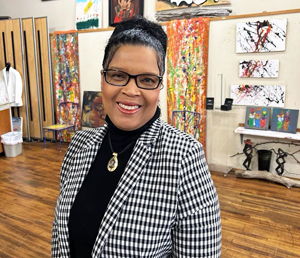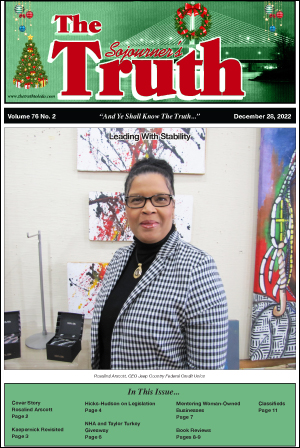
By Rev. Donald L. Perryman, Ph.D.
The Truth Contributor
There is no coincidence that stability brings success, and success brings stability.
– Robert Green
Premier organizations understand that more is required than hiring a great leader. Extraordinary companies ensure that they also hire the right leader. Jeep Country Federal Credit Union maximized its success by accomplishing both when the financial institution hired Rosalind Arscott as its first African American CEO.
The U.S. economy has cycles of ups and downs, including recessions such as the great financial disruption of 2008/2009, which clobbered businesses and financial institutions. Then, the unprecedented COVID-19 pandemic recently closed businesses, brought chaos to individuals’ pocketbooks, and left us operating virtually rather than in-person.
Arscott brings the stability needed to lead well, given the unpredictable times and the unstable future that tends to spark economic fears among financial institutions, such as credit unions.
Hired in as a teller in 1986, right out of college, Arscott has worked full-time at Jeep Country Federal Credit Union for 33 years. She was the first African American employee ever employed by Jeep Credit Union. She then worked herself up the ranks to become the first African American executive and, eventually, the first African American CEO.
I finally caught up with the always-busy CEO to discuss her unique leadership experience, including the stabilizing influence she brings to her organization.

Perryman: What does it take to lead a successful credit union?
Arscott: Strength! It takes a lot of patience, strength and dedication. You have to be strong. It’s very hard. Being an African American in a leadership role hasn’t always been easy. Still, the board we have currently has supported me 100 percent and helped me along the way.
I did break a record last year for this credit union’s earnings. We had never had earnings like that in the credit union’s history, and that is something I did accomplish despite the COVID pandemic. So even though everyone else was struggling, I managed to break financial records for the credit union.
Perryman: What else represents success for you, personally?
Arscott: I’m proud of how I came up through the ranks. I’m proud of how I stuck with it despite the obstacles. I love helping people, which is one of the main reasons I enjoy being in this position. It allows me to reach out and help the community and the surrounding areas because two of our credit unions are actually in underserved areas of Toledo. So, I enjoy being able to reach out and help the community.
Perryman: I’m going to come back to the topic of underserved credit unions. Can you elaborate on some of the struggles and obstacles you mentioned?
Arscott: Just being an African American female, I guess I can put it out there like that: it comes with struggles and challenges. We live in a time and day and age where even though you probably think that we’ve overcome some things. Yet, we still struggle as African Americans to make it in the corporate world and be seen, heard, and taken seriously.
Perryman: Talk about your member groups and your effort to enhance the quality of the membership experience.
Arscott: We are seg-based, so we are not like a community charter. So, that means you have to have an affiliation or be a part of our select group. Our largest group is the Chrysler Jeep Corporation. They just got bought out by Stellantis earlier this year. But we also have churches and other groups. You can also join by area, like from the neighborhood where you live.
Perryman: I found it interesting that you serve several member groups, such as small and medium-sized churches and small businesses. Mainstream credit unions often overlook these typically underserved and smaller groups. What is your strategy behind reaching out to that segment?
Arscott: We look out there to see where we can help or assist. For instance, our North Detroit location is currently closed right now. Still, we’ll remodel that location to better serve our members living there. We’ll also add a drive-thru and ATMs to that location.
Perryman: Yes, that’s a historic location that has been there for a long time.
Arscott: That is actually Jeep Credit Union’s very first brick-and-mortar. Before that, we were located inside the actual Jeep plant. So yes, that’s been there for a while, and I started at that location. I hired in at that location a couple of years after they had built it.
Perryman: How large is the credit union in terms of assets?
Arscott: Our assets fluctuate between $82 million and $85 million, but $82 million roughly. We have a little over 10,000 members.
Perryman: What help do you have available for first-time homebuyers?
Arscott: We are the middleman for mortgages, so we take applications here but contract those out. We research everything to see…government regulations are tied to mortgages. So, we follow their regulations but try to provide the best possible interest rate.
Perryman: Do you do any commercial lending?
Arscott: We do not do commercial lending as of right now. We are researching that. We plan to get into commercial lending very soon. It is a hot market right now.
Perryman: Do you carry mortgages on Jeep’s books, or are they carried on others’?
Arscott: We carry some mortgages on our books, and some mortgages we do not. We also do home equity loans and carry those on our books.
Perryman: Do you expand affordable banking and credit opportunities for low-income or underserved customers?
Arscott: Yes, we do a lot of that. We’re not the typical credit union. We are here to help members and those in need. So, we do try our best to help those who don’t exactly have the best credit rating.
Perryman: Are you doing financial education and programming for consumers, especially young adults?
Arscott: We did offer we had what was called finance 101. We partnered with other credit unions and the credit union league to go into actual schools providing a game formulated to help students understand finances. We are looking into getting back into that in 2023 and doing it ourselves.
Perryman: What is a typical day like for you?
Arscott: I come to work and deal with issues and situations. I have a support staff and an assistant that helps with the day-to-day operations, and I deal with future planning. My day consists of researching, looking for new ideas for our membership, and looking for ways to expand our membership.
Currently, we are expanding our Manhattan location. We are going to make that our main branch. I will put more of our office personnel over in that location so that the members have better accessibility to the executives and the management team. As I said, we’re going to remodel the North Detroit location, adding a drive-thru and ATMs.
We’re trying to come up to speed with technology and the things that our younger clientele want. The younger generation likes mobile apps, the online. They don’t necessarily like to come into a branch. Some of the obstacles we face with that, though, are our older members who don’t like change. They like the old way of doing things, so we’re trying to accommodate both.
Perryman: Millennials have a reputation for job-hopping and change jobs more frequently than any generation in our history. So, what strategies do you have for attracting, developing, and retaining talent?
Arscott: Our managers have been here for a while regarding management talents and all that. They are primarily long-term employees from the credit union, and I believe in promoting from within. If you come in as a teller and display your talent and dedication, I will give you a chance to move up the ranks. So our management team is pretty good. Actually, I’m looking for a compliance officer at this present time. She left but not for bad reasons. She had family issues that she needed to take care of.
Our staffing issues come with tellers. We have a hard time finding support staff. And with the economy, everyone’s having a hard time. Everywhere you go, it says help wanted, help wanted.
Perryman: How about risk management, expanding loans while keeping the loan delinquency down?
Arscott: Yes, you got me there, and I don’t quite know the answer, except that’s the nature of the beast. That’s just there. We’ve been fortunate enough that our income supports our losses. So, it hasn’t been anything that we’ve been really concerned about, but we’ve been able to sustain.
Perryman: So how are you different from a bank and what sets you apart from other credit unions?
Arscott: Well, we’re member-owned, so our members actually have a say-so in the advancement or the decision-making of the credit union. We have annual meetings where the members can come and voice their opinion and ask for whatever services they’re interested in.
As with all credit unions, our membership also elects our board of directors. We’re not for profit. A bank is for profit, looking to make tons of money for their purpose or reasons, but we’re here for the members. Our profits return to helping our members or assisting them with their needs.
Perryman: What makes you stand out from other credit unions?
Arscott: Our name makes us stand out from other credit unions. We have a brand, Jeep Credit Union. Jeep is known worldwide. When you say Jeep, you get that ‘wow,’ I drive a Jeep. When I go to conferences and things, everyone loves our name. So, we stand apart from other credit unions because of our name and brand.
Perryman: Finally, what’s next for you?
Arscott: I’ve been here 36 years. I’ve done my time, and I’m looking for retirement. But, still, even after retirement, I plan on being very active with the credit union. I’ve been here a very long time and through all the changes throughout the years. I have loyalty and dedication to this credit union.
Perryman: Any goals for the credit union before you get out of there?
Arscott: Yeah, to expand, to grow. We all want to grow and come up with new programs to help our members and to help our community.
Perryman: Do you think you can expand the credit union to $100 million in assets before you leave?
Arscott: I’m going to do my best. Yes, I do!
Contact Rev. Donald Perryman, PhD at drdlperryman@centerofhopebaptist.org

